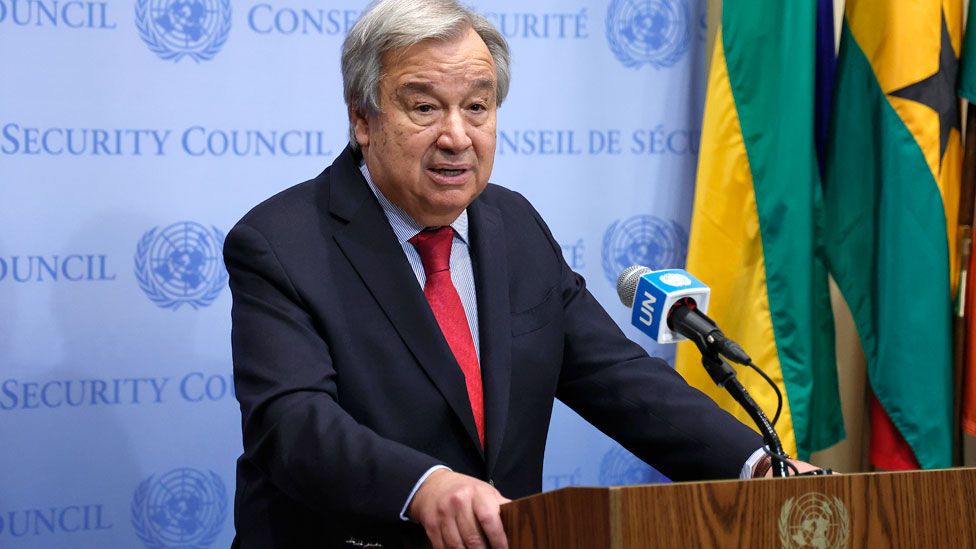United Nation chief, António Guterres has called for Africa to be given a permanent seat at the UN Security Council, a reform aimed at making the body more representative and globally credible.
Speaking at the Security Council Guterres said the current composition of the Council was archaic and undermined the body’s legitimacy.
“We cannot accept that the world’s preeminent peace and security body lacks a permanent voice for a continent of well over a billion people, nor can we accept that Africa’s views are undervalued on questions of peace and security, both on the continent and around the world.”
The five permanent members of the Council – China, France, Russia, the UK, and the US – represent international power dynamics at the end of World War Two, when colonial rule still largely prevailed.
Ten non-permanent seats on the Council are allocated by region, but unlike the five permanent members, they do not have veto power.
The African Union has long called for two permanent continental representatives on the Council and an additional two seats as non-permanent representatives.
Sierra Leone President, Julius Maada Bio, convened the debate, making a case for the continent.
According to Maada Bio: “The time for half-measures and incremental progress is over. Africa must be heard, and its demands for justice and equity must be met.”
He demanded two permanent seats in the UNSC and two additional nonpermanent seats.
“The African Union will choose the African permanent members. Africa wants the veto abolished. However, if UN member states wish to retain the veto, it must be extended to all new permanent members as a matter of justice,” he said.
Other UN officials echoed the sentiments for reform, including Dennis Francis – the president of the UN General Assembly.
Assembly president Francis highlighted Africa’s key role in global peace and security, urging Member States to engage constructively towards substantial reform.
He drew on his own visits, citing firsthand experiences in South Sudan, where he met a few weeks ago with internally displaced persons (IDPs) and witnessed the vital work of the UN Mission in South Sudan (UNMISS).
Mr. Francis also shared insights from his meetings in Haiti, where he discussed the deployment of the Kenyan-led Multinational Security Support Mission (MSS) following the adoption of Council resolution 2699.
Francis argued that these reflected Africa’s significant and growing role in addressing global security challenges.
In his words: “The fact that Africa continues to be manifestly underrepresented on the Security Council is simply wrong, offending as it does both the principles of equity and inclusion.
“It runs counter to the principle of sovereign equality of states and calls for the urgency to reform this institution to reflect the world as it is now, rather than what it was nearly 80 years ago.” He said
The Assembly President went further to recount the first words of the Preamble of the UN Charter “Our objective is to create solutions, along a well-designed process. And most importantly, to win back the trust and the confidence of ‘we the peoples’ of the United Nations.”
Mr. Guterres encouraged the council not just to correct the injustice being melted out to the continent but lend their voices and support Africans initiatives.
“Ensuring this Council’s full credibility and legitimacy means heeding the longstanding calls from the UN General Assembly, various geographic groups – from the Arab Group to the Benelux, Nordic and CARICOM countries – and some permanent members of this Council itself, to correct this injustice,” he said.
Mr. Guterres recalled his policy brief, New Agenda for Peace, launched in July last year. That framework lies at the heart of negotiations over the Pact of the Future, which is to be adopted at next month’s Summit of the Future.
“The Summit provides a critical opportunity to make progress on these issues, and help ensure that all countries can meaningfully participate in global governance structures as equals”, the UN chief told ambassadors.
“I urge all Member States to attend and contribute their views and ideas so that African voices are heard, African initiatives are supported, and African needs are met,” he urged.
Sources: UN News, The EastAfrican, Al Jazeera, BBC.



Leave a Reply